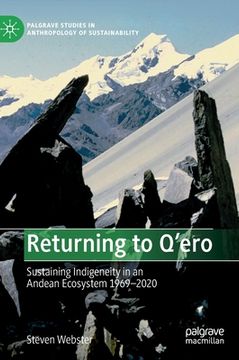Compartir
Returning to q'Ero: Sustaining Indigeneity in an Andean Ecosystem 1969-2020 (en Inglés)
Steven Webster
(Autor)
·
Palgrave MacMillan
· Tapa Dura
Returning to q'Ero: Sustaining Indigeneity in an Andean Ecosystem 1969-2020 (en Inglés) - Webster, Steven
$ 262.018
$ 327.523
Ahorras: $ 65.505
Elige la lista en la que quieres agregar tu producto o crea una nueva lista
✓ Producto agregado correctamente a la lista de deseos.
Ir a Mis Listas
Origen: Estados Unidos
(Costos de importación incluídos en el precio)
Se enviará desde nuestra bodega entre el
Martes 06 de Agosto y el
Jueves 15 de Agosto.
Lo recibirás en cualquier lugar de Argentina entre 1 y 3 días hábiles luego del envío.
Reseña del libro "Returning to q'Ero: Sustaining Indigeneity in an Andean Ecosystem 1969-2020 (en Inglés)"
In this book, social anthropologist Steven Webster provides an ethnohistory of sustainability among the indigenous Andean community of Hatun Q'ero since the 1960s. He first revisits his detailed ecological research among the remote Q'ero in the high Andes of Southern Peru in 1969-1970 and 1977. At that time, Q'ero was a community comprised of several hamlets in converging valleys based primarily on alpaca herding at about 4,300 meters, and composed of about 400 persons in about 80 families. He then relies on the few ethnographies by other anthropologists to document changes in Hatun Q'ero by 2020, spanning 1980-90s when the nation was immersed in agrarian reform followed by virtual civil war between Maoist guerrillas, the government, and the highland peasantry. Through all of these ideological and political-economic developments the sustainability of Q'ero as an integral ecological and social community as well as a famously Incaic cultural tradition becomes a global as well as national issue. This book argues that while the commercial expansion of ceremonial and shamanist tourism can be seen as extractivist similar to industrial mining, the assertive form of independence characteristic of the Q'eros appears to remain sustainable in the face of both these extractive threats. While the Q'ero community is internally reinforced by their reciprocal relationship with the same non-human forces these forms of extraction seek to exploit, they are externally reinforced by the global as well as national rise of indigeneity movements. Ironically, given the moral force developed in some aspects of shamanist tourism, it can even be argued that it supports environmental sustainability against climate change, globally as well as in Q'ero. This book analyzes the increasing importance of indigeneity in the national politics of Peru as well as the other Andean nations in the last few decades, but it remains to set this form of identity politics in its wider "intersectional" context of social class and ethnic conflict in the Andes.
- 0% (0)
- 0% (0)
- 0% (0)
- 0% (0)
- 0% (0)
Todos los libros de nuestro catálogo son Originales.
El libro está escrito en Inglés.
La encuadernación de esta edición es Tapa Dura.
✓ Producto agregado correctamente al carro, Ir a Pagar.

